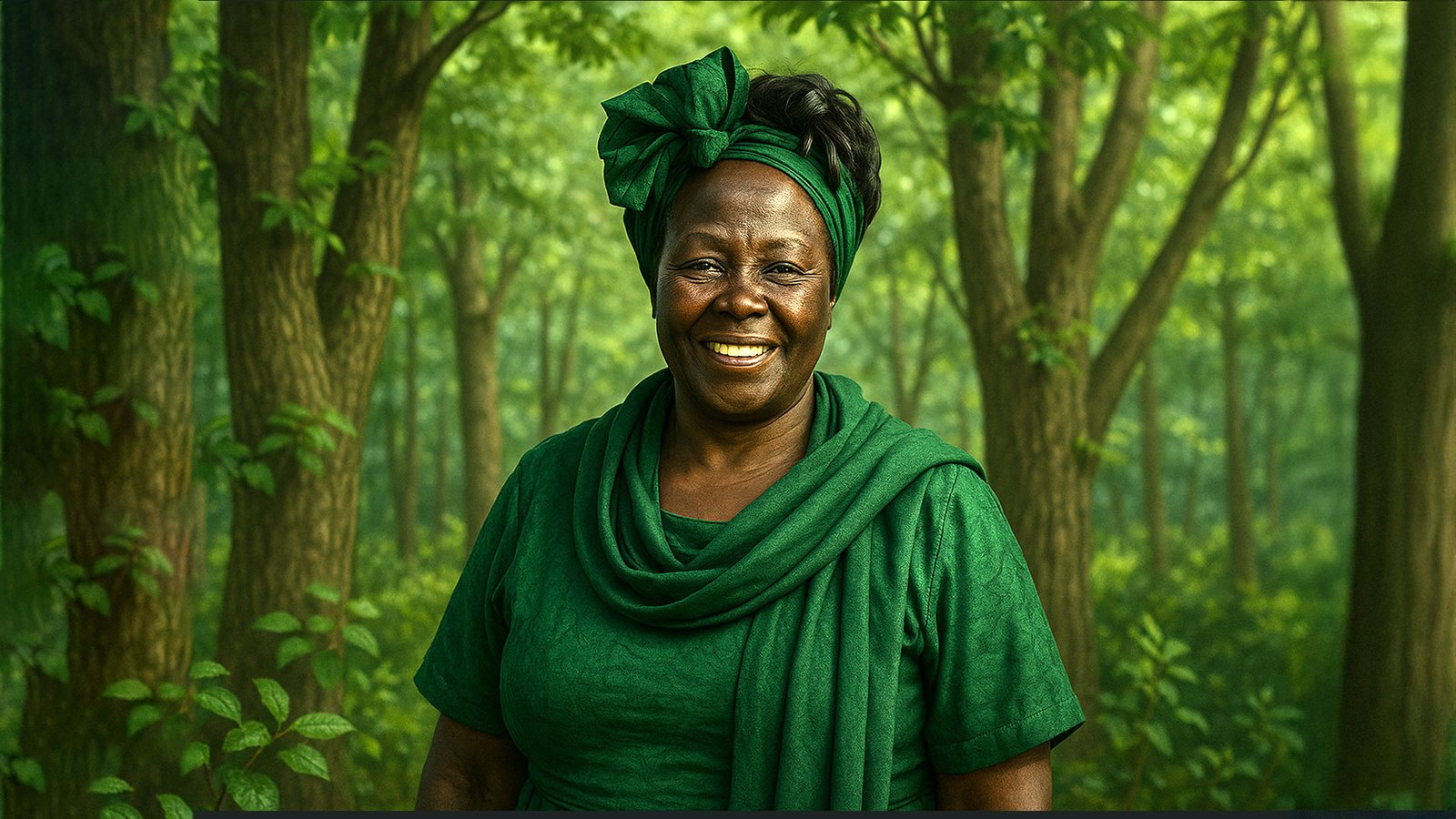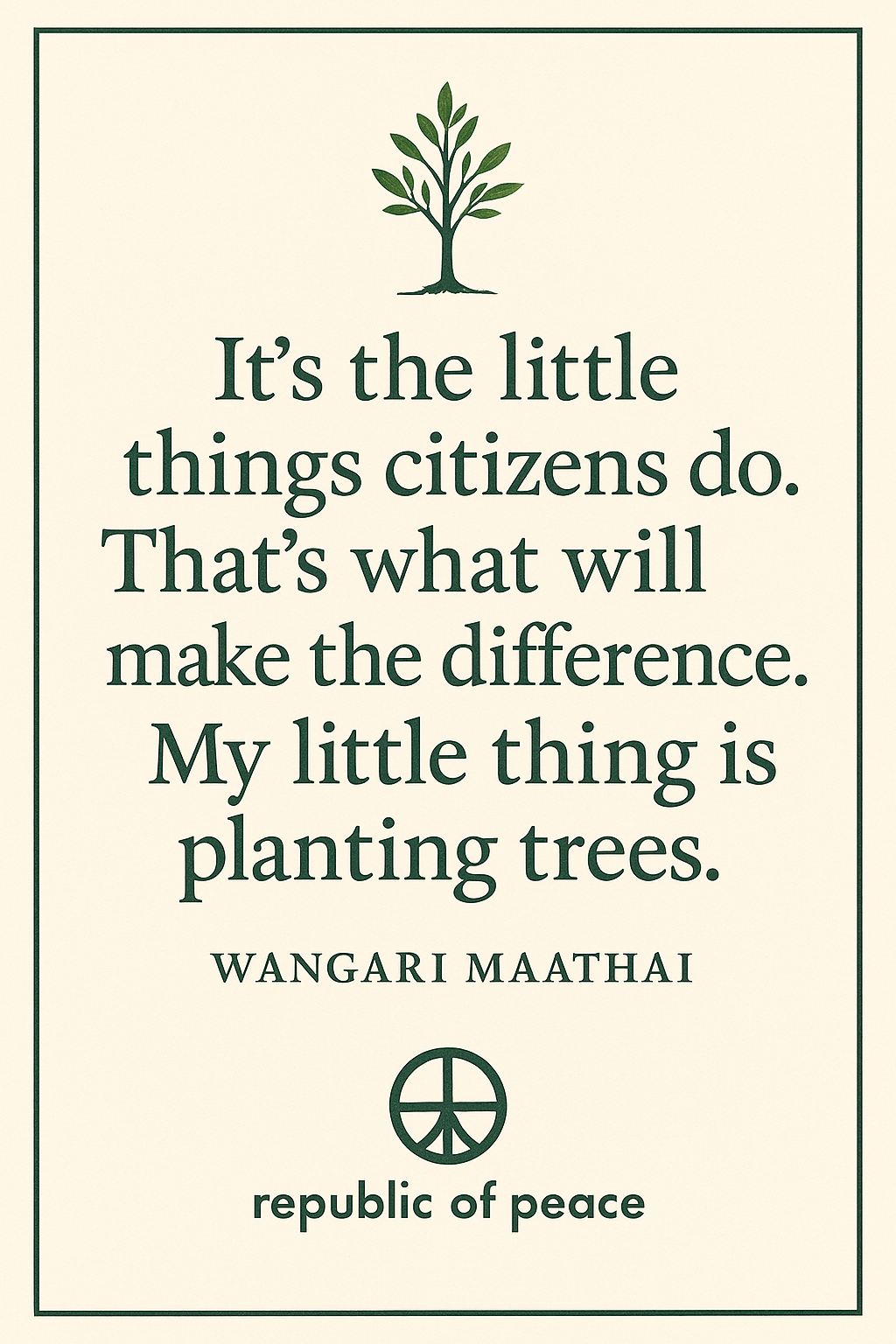Wangari Maathai: The Woman Who Planted Peace

In a world where power often bellows, Wangari Maathai whispered—and the world grew quiet to listen. She didn’t lead armies, she led tree planters. She didn’t wage war; she nurtured peace from the roots up.
The first African woman to win the Nobel Peace Prize, Maathai was a force of nature in the most literal sense. Her life was not just a story of environmental activism. It was a testament to how one woman, armed with vision and courage, can change the planet.
🌱 The Humble Beginnings of a Global Peacemaker
Wangari Maathai was born in 1940 in rural Kenya, in the lush region of Nyeri, nestled near the foothills of Mount Kenya. Her early life was steeped in nature—clean rivers, fertile soil, and canopies of trees that danced with the sounds of birdsong. It was paradise. But even as a young girl, Wangari saw signs of change: forests shrinking, water drying, and colonial policies taking a toll on her homeland.
Her parents, smallholder farmers, valued education deeply. At a time when many girls didn’t finish primary school, Maathai went on to study in the United States, part of the “Kennedy Airlift” program that helped East African students attend college abroad. She earned a biology degree from Mount St. Scholastica College and later became the first woman in East Africa to earn a Ph.D. (in Veterinary Anatomy) from the University of Nairobi.
But academic accolades weren’t enough. She was restless. Something bigger was calling.
🌍 One Tree at a Time: The Birth of the Green Belt Movement
In 1977, Maathai founded the Green Belt Movement, a grassroots organization that empowered women to plant trees, restore landscapes, and reclaim their dignity. What began as a local conservation project exploded into a pan-African environmental revolution.
“It’s the little things citizens do. That’s what will make the difference. My little thing is planting trees.”
— Wangari Maathai
Her simple idea—planting trees to combat deforestation, soil erosion, and poverty—proved revolutionary. These weren’t just trees. They were acts of resistance against corrupt land grabs, authoritarian politics, and the erasure of indigenous knowledge.
Over time, more than 51 million trees were planted across Kenya and beyond. Women gained income, communities regained agency, and rivers ran again.
✊ Resistance in Green
Wangari Maathai was not a soft-spoken activist in the background. She was arrested, beaten, and tear-gassed for challenging the Kenyan regime, especially when she opposed President Daniel arap Moi’s land deals and park encroachments. She led public protests, hunger strikes, and tree-planting campaigns at grave personal cost.
But she never relented.
In 2002, after years of repression, she was elected to the Kenyan Parliament and served as Assistant Minister for Environment. Her voice had become impossible to silence.
🕊️ Nobel Peace Laureate: Planting Global Peace
In 2004, Wangari Maathai became the first African woman to receive the Nobel Peace Prize. But unlike other laureates, she didn’t win for diplomacy or treaties. She won for recognizing that environmental degradation, poverty, and conflict are intertwined. You cannot have peace, she argued, when people are starving, rivers are dying, and forests are gone.
The Nobel Committee honored her for “her contribution to sustainable development, democracy and peace.”
It was a moment that redefined what peacemaking looked like—not a handshake between presidents, but a shovel in a woman’s hand.
📚 Her Words, Her Wisdom
Wangari Maathai was not only a scientist and activist—she was a poet of purpose. Her books are essential reading for anyone longing to connect ecology with equity:
- Unbowed: A Memoir – Her candid, courageous autobiography
- Replenishing the Earth – On the spiritual dimension of ecology
- The Green Belt Movement – The story behind the revolution
- The Challenge for Africa – A searing diagnosis of systemic injustice
“You cannot protect the environment unless you empower people, you inform them, and you help them understand that these resources are their own.”
— Wangari Maathai
Her legacy is also captured in the moving documentary Taking Root: The Vision of Wangari Maathai, which follows her journey from a child in the forest to a global icon.
🌎 The Ripple Effect of a Peacemaker
Wangari Maathai demonstrated that environmental stewardship is a form of peace work. That poverty and deforestation are acts of violence against the future. And that peace begins not in palaces, but in the soil, the seeds, and the courage to begin.

She inspired a generation of young African women to rise up—not with weapons, but with wisdom and will. Her work sparked global tree-planting movements, climate justice coalitions, and policy shifts that continue to unfold today.
💚 What You Can Do Now
- Plant a tree in her honor 🌳
- Read her memoir Unbowed
- Watch the Taking Root documentary (below)
- Share her story with someone who’s never heard it
- Support women-led environmental groups in your community
Taking Root: The Vision of Wangari Maathai
Meet the Filmmaker: Lisa Merton, Taking Root: The Vision of Wangari Maathai
One seed. One hand. One act of faith.
That’s how peace takes root.
Quick Facts
What was Wangari Maathai famous for?
Wangari Maathai was famous for her environmental activism, founding the Green Belt Movement, and being the first African woman to receive the Nobel Peace Prize for her efforts in promoting sustainable development, democracy, and peace.
Who was the first African woman to win a Nobel Prize?
Wangari Maathai.
What was Wangari Maathai accused of?
Wangari Maathai was accused of being a radical and faced criticism for her activism against deforestation and environmental degradation in Kenya, as well as her opposition to government policies that she believed harmed the environment and marginalized communities.
What is Wangari Maathai’s famous quote?
It’s the little things citizens do. That’s what will make the difference. My little thing is planting trees.






